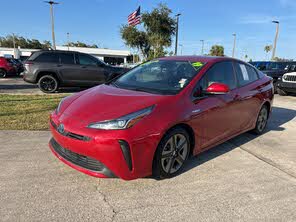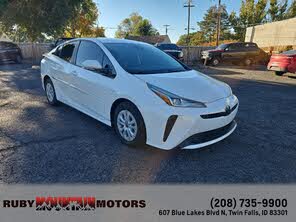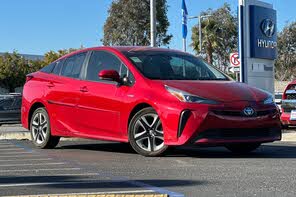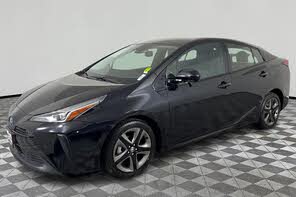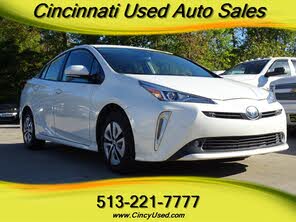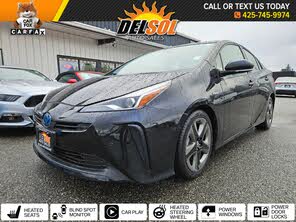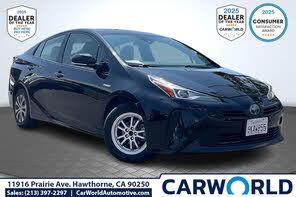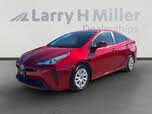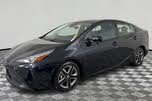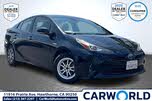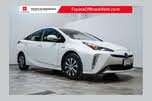2019 Toyota Prius vs 2020 Toyota Prius
Overview | |
MSRP$23,770 | MSRP$24,325 |
Listings211 | Listings120 |
Ratings & Reviews | |
User Reviews | User Reviews |
Expert reviews7.3 out of 10 | Expert reviews7.5 out of 10 |
Pros
Cons
| Pros
Cons
|
2019 Toyota Prius Reviews SummaryReliable, efficient, affordable, practical, and safe, the 2019 Toyota Prius checks off multiple boxes on a typical car shopper’s list. The latest version is even decent to drive, but the Prius' styling does the car no favors. For 2019, Toyota tries to tone down the design, revises its trim-level strategy, and adds a new electric all-wheel-drive option to the car. | |
2020 Toyota Prius Reviews SummaryEver heard of an eponym? It’s a brand or product that is so popular that it’s come to define its respective market. Think of Kleenex for tissues or Band-Aid for medical bandages. For hybrids, the Toyota Prius has ascended to near-eponym status. It was one of the first—and remains one of the most popular—hybrids ever made. As automakers across the industry are rolling out more hybrid models, the Prius continues to be the standard-bearer of this genre. This is largely due to the fact that the Prius is a dedicated hybrid, rather than a hybrid variant of an existing model. Throughout the industry, different companies are taking different approaches to alt-fuel vehicles, including full-electric and hydrogen fuel cell powertrains. The Prius endures as the leader in hybrid power due to a focus on fuel efficiency that doesn’t compromise on style, drivability, and versatility. So how does the Prius hold its ground as more players enter the fray? Read on to find out. | |
No video found | |
Popular Features & Specs | |
Engine1.8L 121 hp I4 Hybrid | Engine1.8L 121 hp I4 Hybrid |
Drive TrainFWD | Drive TrainFWD |
Seating Capacity5 | Seating Capacity5 |
EV Battery Capacity0.7 kWh | EV Battery Capacity0.7 kWh |
MPG City58 | MPG City58 |
MPG Highway53 | MPG Highway53 |
Engine | |
Engine Name1.8L 121 hp I4 Hybrid | Engine Name1.8L 121 hp I4 Hybrid |
DrivetrainFWD | DrivetrainFWD |
Fuel Economy | |
EV Battery Capacity0.7 kWh | EV Battery Capacity0.7 kWh |
MPG City58 | MPG City58 |
MPG Highway53 | MPG Highway53 |
Interior | |
Seating Capacity5 | Seating Capacity5 |
Safety | |
Front Crash Overall4 | Front Crash Overall4 |
Side Crash Overall5 | Side Crash Overall5 |
Dimensions & Capacity | |
Cargo Space27.4 cu ft | Cargo Space27.4 cu ft |
Curb Weight3010 lbs | Curb Weight3010 lbs |
Height57.9 in | Height57.9 in |
Length180.0 in | Length180.0 in |
Width69.3 in | Width69.3 in |
Wheelbase106.3 in | Wheelbase106.3 in |
Maximum Payload825 lbs | Maximum Payload825 lbs |
Number of doors4 | Number of doors4 |
Overview | ||
MSRP | $23,770 | $24,325 |
Listings | ||
Ratings & Reviews | ||
User reviews | ||
Expert reviews | 7.3 out of 10Read full review | 7.5 out of 10Read full review |
Pros & cons | Pros
Cons
| Pros
Cons
|
Summary | Reliable, efficient, affordable, practical, and safe, the 2019 Toyota Prius checks off multiple boxes on a typical car shopper’s list. The latest version is even decent to drive, but the Prius' styling does the car no favors. For 2019, Toyota tries to tone down the design, revises its trim-level strategy, and adds a new electric all-wheel-drive option to the car. | Ever heard of an eponym? It’s a brand or product that is so popular that it’s come to define its respective market. Think of Kleenex for tissues or Band-Aid for medical bandages. For hybrids, the Toyota Prius has ascended to near-eponym status. It was one of the first—and remains one of the most popular—hybrids ever made. As automakers across the industry are rolling out more hybrid models, the Prius continues to be the standard-bearer of this genre. This is largely due to the fact that the Prius is a dedicated hybrid, rather than a hybrid variant of an existing model. Throughout the industry, different companies are taking different approaches to alt-fuel vehicles, including full-electric and hydrogen fuel cell powertrains. The Prius endures as the leader in hybrid power due to a focus on fuel efficiency that doesn’t compromise on style, drivability, and versatility. So how does the Prius hold its ground as more players enter the fray? Read on to find out. |
Video | No video found | |
Popular Features & Specs | ||
Engine | 1.8L 121 hp I4 Hybrid | 1.8L 121 hp I4 Hybrid |
Drive Train | FWD | FWD |
Seating Capacity | 5 | 5 |
EV Battery Capacity | 0.7 kWh | 0.7 kWh |
MPG City | 58 | 58 |
MPG Highway | 53 | 53 |
Engine | ||
Engine Name | 1.8L 121 hp I4 Hybrid | 1.8L 121 hp I4 Hybrid |
Drivetrain | FWD | FWD |
Fuel Economy | ||
EV Battery Capacity | 0.7 kWh | 0.7 kWh |
MPG City | 58 | 58 |
MPG Highway | 53 | 53 |
Interior | ||
Seating Capacity | 5 | 5 |
Safety | ||
Front Crash Overall | 4 | 4 |
Side Crash Overall | 5 | 5 |
Dimensions & Capacity | ||
Cargo Space | 27.4 cu ft | 27.4 cu ft |
Curb Weight | 3010 lbs | 3010 lbs |
Height | 57.9 in | 57.9 in |
Length | 180.0 in | 180.0 in |
Width | 69.3 in | 69.3 in |
Wheelbase | 106.3 in | 106.3 in |
Maximum Payload | 825 lbs | 825 lbs |
Number of doors | 4 | 4 |
The 2019 Toyota Prius was not known for its looks. Despite its unconventional design, it offered a practical solution for daily driving. The 2019 model introduced new trim levels and an optional all-wheel-drive system, enhancing its appeal. The interior featured centralized controls and a unique design, though the gloss black trim attracted dust. The XLE AWD-e test car came with several upgrades, including a head-up display and aluminum wheels, making it a well-equipped option.
The 2020 Toyota Prius retained its familiar shape, optimized for aerodynamics. The design aimed to make it look more like a sedan while maintaining its hatchback functionality. The futuristic style remained contemporary, and the cabin continued to feature a central location for instrumentation. The 2020 model offered various trim levels, each with distinct features, from the entry-level L Eco to the range-topping Limited. The XLE trim added luxury touches like synthetic leather upholstery and wireless device charging, while the 2020 Edition celebrated the model's 20th anniversary with unique accents.


















The 2019 Toyota Prius combined a 1.8-liter 4-cylinder gasoline engine with an electric motor, producing 121 horsepower. The optional AWD-e system added a rear electric motor, providing extra traction at low speeds. The AWD-e system slightly reduced fuel economy, with the standard FWD model achieving 52 mpg combined, while the AWD-e managed 50 mpg. The Prius offered a smooth ride and decent handling, with different driving modes to suit various needs. The CVT transmission and regenerative braking system contributed to its efficiency, making it a practical choice for daily driving.
The 2020 Toyota Prius also featured a 1.8-liter four-cylinder engine paired with an electric motor, delivering 121 horsepower and 105 pound-feet of torque. The AWD-e variant used a second electric motor for the rear wheels, operating up to 43 mph. The Prius offered smooth acceleration and seamless transitions between electric and conventional power. It had three drive modes: EV, Eco, and Power, each catering to different driving preferences. The unique shifter design and Engine Braking mode added to its functionality. The Prius provided engaging handling and a comfortable ride, making it suitable for commuting.
The 2019 Toyota Prius offered comfortable seating for four adults, with manual height adjustment for the driver's seat and heated front seats. Rear passengers enjoyed decent space, though air conditioning vents were absent. The trunk provided up to 27.4 cubic feet of space, expandable to 65.5 cubic feet with the rear seats folded. The AWD-e variant had slightly less cargo space. The Prius's hatchback design made it a practical choice for carrying luggage and other items.
The 2020 Toyota Prius made efficient use of its space, with deep door pockets and a large tray area between the front seats. The front seats were spacious and comfortable, with good visibility for the driver. The rear seats offered ample space, though taller passengers needed to be cautious. The Prius provided 50.7 cubic feet of cargo space with the rear seats folded and 24.6 to 27.4 cubic feet with the seats up, depending on the trim. The hatchback design facilitated easy loading of bags and large items, enhancing its versatility.
The 2019 Toyota Prius Limited trim featured an 11.6-inch touchscreen with navigation, the Entune App Suite, and a premium JBL sound system. The XLE AWD-e test car had a standard 6.1-inch touchscreen with Bluetooth and a CD player. The instrumentation was housed in a horizontal strip below the windshield, with some displays appearing outdated. The Advanced Technology Package included a head-up display and adaptive headlights. However, the infotainment system lacked Apple CarPlay and Android Auto, limiting its modern connectivity options.
The 2020 Toyota Prius came standard with a 7-inch touchscreen, offering a user-friendly menu layout and standard features like Android Auto, Apple CarPlay, Bluetooth, and a WiFi hotspot. The Limited trim upgraded to an 11.6-inch screen with a customizable layout, though it lacked Android Auto. The Prius also offered satellite radio, HD Radio, a head-up display, and a 10-speaker JBL audio system. The top-center instrument panel provided hybrid drivetrain status and other critical readouts, with menus accessible via the steering wheel.
The 2019 Toyota Prius Limited trim included Safety Connect services, offering features like automatic collision notification and emergency assistance. Standard safety features across all trims included adaptive cruise control, forward-collision warning, automatic emergency braking, lane-departure warning, lane-keeping assist, and automatic high beams. The LE trim added blind-spot monitoring, rear cross-traffic alert, and parking sensors. The Prius received a 5-star rating from the NHTSA and a Top Safety Pick rating from the IIHS.
The 2020 Toyota Prius came with Toyota Safety Sense 2.0, including automatic emergency braking, forward-collision warning, lane-departure warning, adaptive cruise control, and automatic high beams. Optional features included blind-spot monitoring, rear cross-traffic alert, parking sensors, and active park assist. The lane-tracing assist helped center the vehicle in its lane. The Prius earned a five-star rating from the NHTSA and a Top Safety Pick rating from the IIHS, though it fell short of the highest rating due to average scores in certain tests.
CarGurus highlights

According to CarGurus experts, the overall rating for the 2019 Toyota Prius is 7.3 out of 10, while the 2020 Toyota Prius scores 7.5 out of 10. Based on these ratings, the 2020 Toyota Prius is the better choice, offering improved technology, enhanced safety features, and a more refined interior.
Choose the 2019 Toyota Prius if:
- You prefer a lower starting price and are okay with fewer tech features.
- You want a practical daily driver with good fuel economy.
- You need a spacious hatchback with ample cargo space.
Choose the 2020 Toyota Prius if:
- You want the latest tech features, including Android Auto and Apple CarPlay.
- You prefer a more refined interior with additional comfort and convenience features.
- You seek enhanced safety features and a slightly higher overall rating.
CarGurus highlights

According to CarGurus experts, the overall rating for the 2019 Toyota Prius is 7.3 out of 10, while the 2020 Toyota Prius scores 7.5 out of 10. Based on these ratings, the 2020 Toyota Prius is the better choice, offering improved technology, enhanced safety features, and a more refined interior.
Choose the 2019 Toyota Prius if:
Shop Now- You prefer a lower starting price and are okay with fewer tech features.
- You want a practical daily driver with good fuel economy.
- You need a spacious hatchback with ample cargo space.
Choose the 2020 Toyota Prius if:
Shop Now- You want the latest tech features, including Android Auto and Apple CarPlay.
- You prefer a more refined interior with additional comfort and convenience features.
- You seek enhanced safety features and a slightly higher overall rating.

By: CarGurus + AI
At CarGurus, our team of experienced automotive writers remain at the heart of our content operation, conducting hands-on car tests and writing insightful guides that are backed by years of industry experience. To complement this, we are harnessing AI to make our content offering more diverse and more helpful to shoppers than ever. To achieve this, our AI systems are based exclusively on CarGurus content, ratings and data, so that what we produce is both unique to CarGurus, and uniquely helpful to car shoppers.







